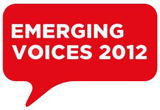 Juggling personal and professional lives in search of the perfect balance is an art that women and men across the world, in different spheres of work, are familiar with. How does this play out in the life of a female health researcher? At the Health Systems Research Symposium held in Beijing recently, a group of young female public health professionals from the “Emerging Voices” programme came together with their male counterparts to discuss the challenges and opportunities they face and have observed as young female researchers in the field of health systems research.
Juggling personal and professional lives in search of the perfect balance is an art that women and men across the world, in different spheres of work, are familiar with. How does this play out in the life of a female health researcher? At the Health Systems Research Symposium held in Beijing recently, a group of young female public health professionals from the “Emerging Voices” programme came together with their male counterparts to discuss the challenges and opportunities they face and have observed as young female researchers in the field of health systems research.
Although improving today, the evident underrepresentation of women in leadership positions led to the idea of exploring the issue of the glass ceiling—a term that was first used in the 1980s to indicate the lack of women in leadership positions in the workplace. What began as a fishbowl discussion on the challenges faced by female researchers, opened up into a debate of the challenges facing women in the workplace generally, raising multiple questions.
At the heart of the discussion was the conflict between balancing a family life and career that most female participants feel they face. With extensive travel, often for extended periods of time and to remote locations, is health systems research a family friendly career option for women? Is time taken for maternity leave a barrier to promotion? Have organisations, communities, and smaller family units evolved enough to accept the role of women as professionals along with their more traditional roles as wives, mothers, and carers of the old, young, and infirm?
The personal-professional conflict was further reflected in anecdotal evidence of female PhD candidates being discouraged from having families alongside their academic commitments. There were examples of almost equally qualified men being selected over women for positions. There were also examples of workplace norms which encouraged longer work hours that indirectly led to choices to delay childbearing for some female professionals. In some countries workplace policies that offered short maternity leave were felt to be insufficient for women to be able to look after very young babies as they had to return to work.
The Emerging Voices also felt that different yardsticks were used to measure the behavior and performance of men and women in the workplace. It was felt that women were allowed to make fewer mistakes once they reached senior leadership positions and had to constantly justify their positions.
Gender stereotyping also came up as an issue. Stereotypes ranged from associations of beauty with incompetence, to negative attitudes towards women who choose to forego childbearing to focus on their career, or conversely those who choose to have children and then take maternity leave.
However, all is not bleak and challenging, there are more women getting higher degrees today (over 60% of college graduates in the US are women), and women are increasingly entering spaces previously reserved for men. Some of the “Emerging Voices” from India mentioned examples of women from socially and economically disadvantaged areas transforming the health indicators of entire villages.
There are obvious biological differences between men and women. Bearing children is something that only women can do. Keeping these differences in mind, can social structures evolve to support women so that having and raising children is something that women can do alongside professional responsibilities? Instead of placing the responsibility on a woman of choosing “the right man”—societal and structural solutions are necessary (equal pay for men and women, day-care facilities for young children in workplaces). Both men and women should be able to develop supportive social and professional systems that would allow families and individuals to give equal opportunities to both genders.
Radhika Arora, Public Health Foundation of India; Natalie Eggermont, Institute of Tropical Medicine, Antwerp; Fabienne Richard, Institute of Tropical Medicine, Antwerp; Ildikó Bokros, Institute of Tropical Medicine, Antwerp; Marsha Orgill, Health Economics Unit, University of Cape Town.
The authors are part of the “Emerging Voices for Global Health” programme of the Institute of Tropical Medicine, Antwerp, Belgium (http://www.ev4gh.net). Run concurrently and in collaboration with the Global Symposium on Health Systems Research, the programme provides training, mentoring, and networking opportunities for promising young health researchers and professionals from low and middle income countries. The views presented by the authors are solely hers and not of her affiliated institution.
